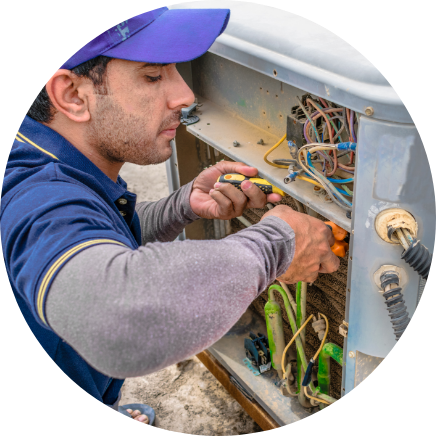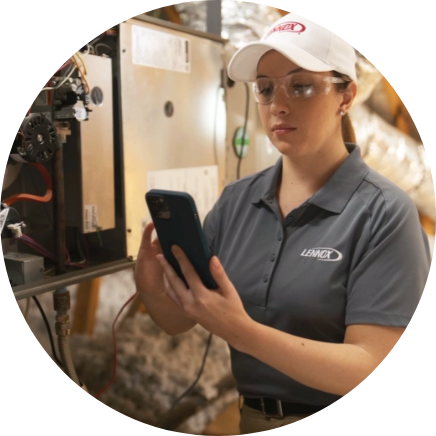The Basics: HVAC Today
Proper heating, ventilation, and air conditioning–and the people who deliver it–play a quiet but crucial role in the daily lives of most people, ensuring they can live, work, and play in comfortable, safe indoor environments. HVAC technicians and other industry professionals are responsible for installing, maintaining, and repairing HVAC systems in residential, commercial, and industrial settings.
The growing demand for energy-efficient buildings and equipment has increased the need for proper ventilation and air quality, making trained HVAC professionals more important than ever. These skilled individuals are essential to ensuring that buildings, both old and new, are equipped with efficient heating and cooling systems that not only provide comfort, but also contribute to energy conservation and cost savings.

Growth and Demand in the HVAC Industry
As an industry, HVAC services are in high demand. Because of this, as a career path, HVAC offers tremendous opportunities for growth.
According to the Bureau of Labor Statistics, the job outlook for HVAC technicians is expected to grow by 6% from 2022 to 2032. This growth rate is considered faster than the average for all occupations. The need for HVAC technicians is driven by several factors.
One of the key factors driving this growth is the increasing complexity of HVAC systems. As the demand for more energy-efficient systems drives technology advancements, HVAC systems are becoming more sophisticated. This new equipment requires skilled technicians who can install, maintain, and repair these advanced systems. Additionally, the growing emphasis on environmental sustainability has led to a greater demand for HVAC professionals who can help optimize energy usage and reduce the carbon footprint of the buildings they service.
This rise in demand has also increased career advancement and growth opportunities across the industry. Today’s technicians can specialize in specific areas such as installation, maintenance, or repair. They can also pursue certifications and advanced training to expand their knowledge and skills. With experience and additional qualifications, there is a lot of opportunity for HVAC professionals to progress into supervisory or management roles or, for those pros who are more entrepreneurial, venture out to start their own HVAC service businesses.
Education and Training for HVAC Careers
When it comes to pursuing a career in HVAC, obtaining the right education is crucial. There are a variety of training programs available to help individuals develop the necessary skills and knowledge required for a successful career in the field.
Education and Training for HVAC Careers
When it comes to pursuing a career in HVAC, obtaining the right education is crucial. There are a variety of training programs available to help individuals develop the necessary skills and knowledge required for a successful career in the field.

According to a report from Georgetown University’s Center on Education and the Workforce, the cost of college and university programs have surged 169% since 1980. Meanwhile, vocational schools and trade programs have remained a fraction of the cost, despite both routes leading to jobs with comparable salaries.
Vocational Schools
The most common HVAC training programs are offered through vocational or technical schools. These programs typically offer hands-on training and cover topics such as electrical systems, refrigeration, heating systems, and air conditioning. They provide a well-rounded education that prepares students for entry-level positions in the industry.
In addition to vocational schools, some community colleges and trade schools also offer HVAC associate degree programs.
Training can even begin at the high-school level, giving motivated younger people a head start as they enter the HVAC workforce. Some high-schools offer construction and HVAC-specific programs that teach basic industry skills - helping students obtain internships and giving them a springboard into further training.
Selecting a School
There are a number of vocational schools available across North America. A simple internet search should return several options available near you. Take some time to research them. Be sure to review their curriculum to ensure they offer the courses or certifications you’re looking for within your budget. Also check each program’s ratings and any available reviews from prior students.
Pros & Cons of Vocational Schools
Pros
- Students will complete a formal education program that will help them get started in the HVAC industry.
- Programs are highly structured and great for individuals who learn well in a classroom setting.
- Vocational school graduates can move on to earn incomes comparable to 4-year college degree recipients - at a fraction of the overall cost.
Cons
- Programs can be costly, but the investment is still only a fraction of the cost of a 4-year degree.
- The student will not be able to start earning a living until they’ve completed the program and secured a position with an HVAC employer.
- Coursework is often more focused on theory than practical application.
HVAC Apprenticeships
An apprenticeship program can also be a solid route to entering the industry. These programs allow individuals to learn on the job while working under the guidance of experienced HVAC professionals. Apprenticeships provide a combination of classroom instruction and practical training, giving participants the opportunity to apply their knowledge in real-world scenarios.

Lennox Learning Solutions:
BuildATech® Program
Another option is the Lennox BuildATech program. BuildATech is an immersive training program offered through Lennox Learning Solutions – Lennox’ in-house education and training system. BuildATech takes a practical approach to industry training while affording the student access to Lennox experts and online course material. Qualified Level 1 technicians will begin on-the-job training as little as 3 weeks from joining the program.
Getting Started
When taking the BuildATech route, no industry experience is required. You simply need to have the right attitude and some level of technical competency. Locate and connect with a Lennox dealer interested in hiring a BuildATech candidate. Once you’re on board, they will register you for the BuildATech Level 1 course.
Growth Opportunities
The BuildATech program was designed with personal growth in mind. It includes 3 levels of training:
Level 1 is designed for individuals who are new to the industry. After just 3 weeks of classroom training, you will graduate with an EPA certificate and take the NATE certification test. Graduates become Maintenance Techs, qualified to perform on-site tune-ups on consumer equipment.
Level 2 is for those who has some industry experience and/or have completed the Level 1 program. Graduates of this course will have intimate knowledge of how to properly diagnose issues preventing a system from operating properly. Individuals who have completed the Level 2 course are qualified to perform service calls on customer equipment in the field. They will receive their EPA certificate and be able to take the NATE certification exam (if they haven’t previously done so).
Level 3 is extended training for Level 2 graduates, or more experienced technicians. Coursework dives into more complex servicing issues than previous levels of the program.
Value
BuildATech technicians are able to bypass the time and expense of vocational training or a college degree. Many Lennox Learning Solutions graduates have gone on to earn six figure incomes without the heavy debt of a college education. The program also allows business owners to overcome the HVAC tech shortage, bringing new talent into their businesses (and the HVAC industry) while establishing themselves as an employer of choice.
Benefits
BuildATech graduates can join the industry quickly and begin earning money as an HVAC technician within a very short period of time. Once employed, they will receive access to further training and education through Lennox Learning Solutions, allowing them the opportunity to grow their knowledgebase. The dealers who bring them on get to grow their businesses, filling technician slots with motivated, Lennox-trained people who understand the equipment, methods and values behind being a Lennox team member.
With new technologies and regulations introduced frequently, the field of HVAC is constantly evolving. Continuing education is extremely important. By taking advantage of available training opportunities, professionals can stay up-to-date with the latest industry developments, enhance their technical skills, and improve their career prospects.
Technicians can expand their knowledge in many ways. They can participate in workshops, attend seminars or conferences, take online courses, or study to earn advanced certifications. This ongoing learning process not only deepens a professional’s knowledge, it helps them adapt to changes in the industry and provide better service to their customers.
Tips for Building a Successful HVAC Career
Building a successful career in the HVAC industry requires a combination of technical expertise, professional networking, and adaptability to industry changes. Here are some tips to help you navigate your HVAC career path:

Start Networking & Join Professional Associations in the HVAC Industry
One of the key factors in advancing your HVAC career is building a strong professional network. Networking allows you to connect with industry experts, potential mentors, and potential employers. Joining professional associations such as the Air Conditioning Contractors of America (ACCA) or the Heating, Refrigeration and Air Conditioning Institute of Canada (HRAI) can provide valuable opportunities for networking, continuing education, and staying updated on industry trends.

Develop Technical & Soft Skills for Career Progression
To excel in the HVAC industry, it’s essential to continuously develop your technical skills. Stay updated on the latest technologies and advancements by attending workshops, training programs, and industry conferences. Additionally, don’t overlook the importance of soft skills such as communication, problem-solving, and customer service. Enhancing these skills can help you stand out in the competitive HVAC job market and open doors to career advancement.

Adapt to Industry Advancements & Technological Changes
The HVAC industry is constantly evolving, with new technologies and advancements shaping the way we work. It’s crucial to stay adaptable and embrace these changes to remain relevant in your career. Keep yourself informed about energy-efficient solutions, smart HVAC systems, and sustainable practices. This knowledge will not only benefit your professional growth, but also make you a valuable asset to employers and customers who prioritize sustainability and energy efficiency.
By all accounts, the HVAC industry offers a promising, long-term career path. A positive job outlook driven by advancing technology and the growth of the construction industry means ample opportunity for career advancement and growth within the industry. Whether you’re just starting your HVAC career or looking to take the next step, the industry offers a rewarding and fulfilling path.
Best of luck in your HVAC journey!


